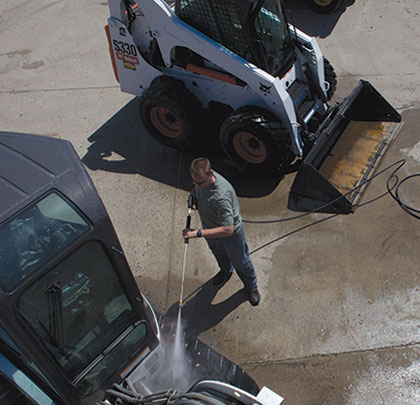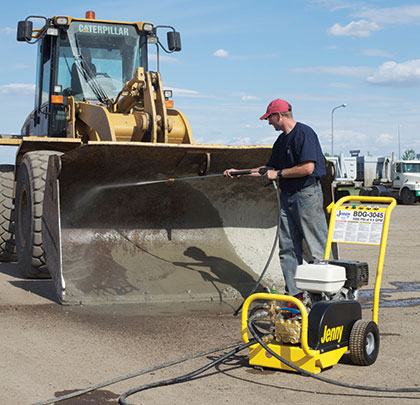Finding the right pressure washer for the job isn’t as easy as it sounds. If you choose an underpowered product, the results will be disappointing. Going with an oversized unit adds inconvenience and extra cost. Not to mention, you risk damaging property.
So how does a person determine what type of pressure washer he needs? Education is the only answer. It takes an understanding of the machine, the application, and the cleaning process itself to make a proper selection.
HOT OR COLD?
As with any learning process, it’s best to start with the basics. In the case of pressure washers, this means figuring out whether a hot- or cold-water unit is needed.
Cold pressure washers are the most popular option. They’re compact and economical, and they’ll do the trick for a large number of cleaning jobs. Generally, cold-water units are best at washing away dirt and mud. That alone covers a lot of applications, from washing a construction vehicle to cleaning concrete.
Where cold water falls short, however, is removing grease or grime (dirt that is ingrained or clinging to a surface). A cold pressure washer may push these substances around, but it won’t produce a clean surface. For instance, if the machine is used to clean the fifth wheel on a tractor-trailer, it will likely splatter and smear the heavy grease, rather than wash it off.
When dealing with grease, grime, and oil, a hot pressure washer is usually a better choice. That’s because hot water actually cuts through grease, loosening it from the surface. Once the bond between the grease and the surface has been broken, it can then be washed away.
Also, remember that the performance of either a hot or cold pressure washer can be enhanced by using cleaning chemicals. There are a variety of detergents available for use with pressure washers, and using the right one can help the cleaning process go much more smoothly.
POWER PREFERENCE
Both hot and cold pressure washers are available with electric motors or gas-powered engines. This decision is largely based on where the machine will be used. If it will be operated outdoors without adequate electrical sources nearby, then a gas-powered unit is the best bet. Otherwise, many people prefer electric motors for their cost efficiency, low maintenance, and quiet operation. Keep in mind that many of the higher-powered electric pressure washers require a 230-volt, three-phase power source, which isn’t readily available in many locations.
SPEC CHECK
After deciding on the type of pressure washer, a person must determine what specifications will best meet his needs. Pressure, volume, and horsepower ratings are often misunderstood, but they play a large role in the performance of a pressure washer.
Start by considering pressure. Simply put, its purpose is to help break the bond between the contaminant and the surface being cleaned. If the pressure is too low, the bond won’t break without extra help from hot water or detergents. If the pressure is higher than what’s needed, the dirt will blow around more, and the high-pressure spray may even damage the surface.
With this in mind, it’s best to find a happy medium—a pressure washer that has adequate ratings for the type of use it will experience. For instance, if the user will mostly be washing his vehicles, a 1,500-psi unit may work fine. If washing agricultural, construction, or mining equipment, consider using at least 2,000 psi. For industrial jobs, 3,000 psi or more is often required.

Many people assume that pressure is the only important rating of a pressure washer, but that’s not true. Volume, which is stated in gallons per minute (gpm), equally affects cleaning performance. After the pressure has broken the bond between the contaminant and the surface, the contaminant must be washed away. And the greater the flow of water, the better the substance rinses off. In fact, professionals rely on high-volume units to complete their cleaning jobs quickly.
Although one might assume that a high-volume pressure washer would only consume large amounts of water, this is not necessarily the case. The average garden hose dispenses between 6 and 8 gpm, while the average pressure washer only puts out 3 to 4 gpm. Therefore, even the highest-rated pressure washers usually offer some type of water savings.
The third factor, horsepower, is useful because it determines how much pressure and volume a pressure washer can produce. For example, a 3,000-psi, 4-gpm unit requires at least an 11-horsepower gas engine to achieve those outputs. Anything less than 11 horsepower will deliver less pressure and volume than the pump’s actual rating.
The guidelines for picking a pressure washer aren’t complicated, but they’re important. That’s because your money may be wasted if you spend it on an inadequate unit that does a poor job. Even worse, the cleaning project could end up costing way more than anticipated if you damage a surface with an oversized pressure washer. In the end, learning these guidelines will be well worth the time. And getting the job done right will be well worth the investment. ■
About The Author:
Daniel Leiss is president of Jenny Products Inc. For more information, visit www.steamjenny.com.
_________________________________________________________________________
Modern Contractor Solutions, March 2013
Did you enjoy this article?
Subscribe to the FREE Digital Edition of Modern Contractor Solutions magazine.

How To Pick A Pressure Washer


